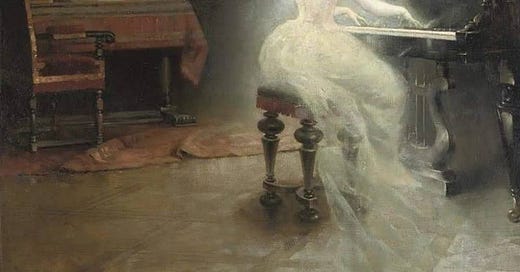Thanks for reading this newsletter. And thanks even more if you’re a subscriber. And thanks even more again if you subscribe and regularly open the emails you get from me. It’s all much appreciated.
I’m getting sappy about you, my beloved readers, because I’m about to take a break. At least until I can finish my thesis and get settled into a new, post-academic routine, I can’t promise you any fresh #content.
I definitely plan to keep this newsletter going. This is not goodbye. I just need a break. You’ve kept coming back, and I’ll be coming back. This is a lot of fun for me, and I hope it is for you, too.
Speaking of coming back, here’s the opening of my second-favorite poem1:
There are many people who come back
After the doctor has smoothed the sheet
Around their body
And left the room to make his call.They die but they live.
They are called the dead who lived through their deaths,
And among my people
They are considered wise and honest.
I honestly don’t know why I like The Light the Dead See so much. I love ghosts, of course. I love them so much that the lines quoted above provide the epigraph to my current novel project, which is about—drumroll—ghosts. But there are other poems about ghosts. What is it about Frank Stanford’s brief supernatural elegy?
That Stanford himself led such a literarily electric and sadly brief life adds to the mystique of any of his work, but especially a poem about death. When he was only 29 and already a celebrated writer, Stanford went upstairs in his house and killed himself. His wife and his lover—the poet C.D. Wright—were both downstairs at the time. It feels inconsiderate to speculate about the torrent of feelings Stanford must have been having. I will say that it’s a shame we lost him so young.
I tend to come back—coming back, yet again—to art that makes me feel something I can’t fully articulate. Recently I defined “talent,” in the case of fiction writers, as the ability to emotionally surprise a reader. I think there’s something to that: If you can make people feel something that gets to them but that they can’t dissect, can’t explain away as conventional aesthetic manipulation, then you’re in talented hands.
Stanford does that for me in this poem. Here’s another snippet:
A roar sucks them under
The wheels of a darkness without pain.
Off in the distance
There is someone
Like a signalman swinging a lantern.The light grows, a white flower.
It becomes very intense, like music.They see the faces of those they loved,
The truly dead who speak kindly.
Like a signalman swinging a lantern.
The faces of those they loved.
A white flower of light.
Images like these are specific enough to conjure an imagined reality, but general enough to elude particular character. There is no story here, aside from the broad and vague arc of ghosthood. A feeling emerges—a soothing wistfulness is how I’d describe it—but it’s not even clear who’s feeling it. We’re merely invited into an attempt, doomed to fail, to articulate the inarticulable.
Contra Wittgenstein, the best writing is often an attempt to put into words that which defies words.
I may have to revisit this poem and write more on it at some point, but it’s getting late and I’m once again realizing that I don’t have any profound thoughts about this poem. I just like it a lot. Time for me to slip into the realm of the half-alive.
Calvin and Hobbes Corner
Our Society is currently obsessed with what “money” is, whether that discourse takes the form of debates about the federal budget or the metaphysical qualities of Bitcoin. (It’s not currency, that’s ridiculous—if it were currency, you could use it for things.) So it’s timely that we’ve alighted on Calvin getting aliens to believe that leaves are money. Anything can be money if we all agree it is! (Except Bitcoin—that’s definitely not money.)
It’s actually a little surprising that Calvin doesn’t jump at the chance for intergalactic war. For one thing, Spaceman Spiff is always fighting aliens, often with relish. For another, Calvin fights wars against such titanic foes as monstrous snowmen and Susie Derkins. He’s a born warrior, if usually a comically ineffectual one. He must be truly be desperate to agree to a diplomatic trade.
We also get Calvin’s bed-time on the record in this strip: 8pm. Reasonable for a six-year-old. At the moment, it sounds reasonable for me, too.
A poem
C.D. Wright is aflame
My favorite poem is the source of this newsletter’s title






Connor, I have loved reading your newsletter and I look forward to it coming back. I hope your time away is fruitful. Good luck!! PS: I second the Saunders recommendation.
Good luck on the thesis; hopefully you find the time away fruitful. The mule deer have returned to graze on the few sun-stripped spots of grass amidst the snow and ice, and approach the kitchen door, hesitantly, to beg for salty crackers; it's time to step away from the internet.
I appreciate this post, in particular its abrupt end; there's no need to expand beyond outlining your enjoyment, sometimes. One small quibble: Wittgenstein (late Wittgenstein, at least) would agree that the best writing is that through which the inexpressible 'shows itself;' his great paradox is that the inexpressible, by our 'running up against the limits of language,' nevertheless finds itself expressed. I think that puts him close to the theory of good writing you're sketching out here.